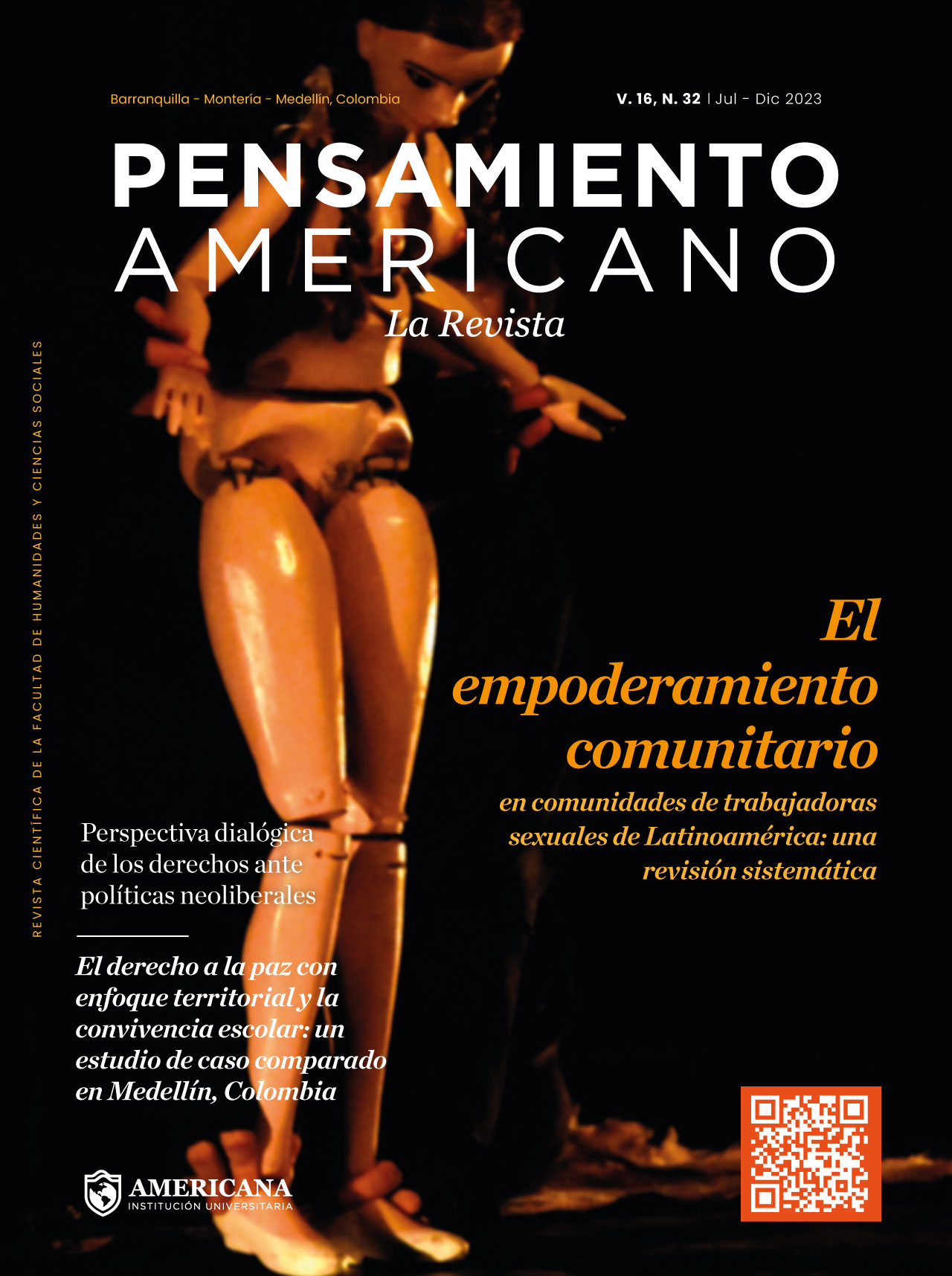Model to promote Urban Agriculture based on SDG 2 and 11in the District of Barranquilla
DOI:
https://doi.org/10.21803/penamer.16.32.690Keywords:
Urban agriculture, self-sufficiency, food security, sustainable development goals and sustainable citiesAbstract
Introduction: Urban agriculture has its roots in the 1950s, when the war forced peasants to abandon their land and migrate to the cities, which were dominated by the convenience of canned food. These agricultural traditions have been passed down keeping the legacy of urban agriculture. Objective: The Food and Agriculture Organization of the United Nations (FAO) highlights five crucial points: balance between population growth and economic growth; the detriment of forests, savannahs and wetlands; the excessive use of nitrogen fertilizers, the overexploitation of the oceans and the accelerated use of fossil fuels. Reflection: the article seeks to expose the arguments presented by FAO which have led 193 countries to join efforts searching for effective solutions to counteract the devastating impacts of these practices. Conclusion: Among the purposes of this reflection is the generation of awareness to care for the environment to ensure a sustainable future. Therefore, creating models to promote Urban Agriculture as a strategy in the consolidation of the goals of SDG #2 (Zero Hunger) and #11 (Sustainable Development Goal) in the District of Barranquilla, can be one of the proposals to mitigate damage to the environment, help eliminate hunger, food insecurity and malnutrition.
Downloads
References
Antúnez, A. M. C., Morales, C. E. B. y Araujo, D. R. S. (2019). La sostenibilidad global en una empresa de transporte urbano de viajeros en autobús: Estudio de caso. In Memorias del III Congreso internacional en administración
de negocios internacionales (CIANI): Retos y oportunidades del desarrollo sostenible en los negocios internacionales (pp. 28-42). Universidad Pontificia Bolivariana. file:///C:/Users/Usuario/Downloads/Dialnet-MemoriasDelIIICongresoInternacionalEnAdministracio-746049.pdf
Esteche, E., Gerhard, Y., & Escurra, M. L. (2023). Vinculación universidad-empresa para desarrollar innovación - caso de una universidad privada y emprendedores de la ciudad de Encarnación. Estrategia Y Gestión Universitaria, 11(2), 86–109. https://doi.org/10.5281/zenodo.8147331
Gómez Cano, C. A., & Sánchez Castillo, V. (2023). Estrategias para el fortalecimiento del Programa de Administración en la Universidad de la Amazonia. Estrategia Y Gestión Universitaria, 11(2), 33–52. https://doi.org/10.5281/zenodo.8145076
Lara, A. (2008). Agricultura urbana en Bogotá: implicaciones en la construcción de una ciudad sustentable. (Tesis de pregrado, Universidad Javeriana). https://repository.javeriana.edu.co/bitstream/handle/10554/7809/tesis125.pdf?sequence=1
López Ricalde, C. D., López-Hernández, E. S. Ancona Peniche, I. (2005). Desarrollo sustentable o sostenible: una definición conceptual. Horizonte Sanitario, 4(2).
Morán, N. (2010). Artículo. Agricultura Urbana: un aporte a la rehabilitación integral. Papeles de relaciones ecosociales y cambio global. 111. 99-111.
Mougeot, L. (2006). Cultivando mejores ciudades: Agricultura urbana para el desarrollo sostenible. Centro internacional de investigaciones para el desarrollo. Ottawa, ON, Canadá K1G 3H9.
Organización de las Naciones Unidas para la Alimentación y la Agricultura (FAO). (2017). El estado mundial de la agricultura y la alimentación. https://www.fao.org/3/I7658s/I7658s.pdf
Organización de las Naciones Unidas para la Alimentación y la Agricultura (FAO). (2019). El apoyo de la FAO para alcanzar los Objetivos de Desarrollo Sostenible en América del Sur. Panorama. Santiago de Chile.
Organización de las Naciones Unidas para la Alimentación y la Agricultura (FAO). (2015). La FAO y los 17 Objetivos de Desarrollo Sostenible.
Rodríguez, M. (1994). El desarrollo sostenible: ¿Utopía o realidad para Colombia? La política ambiental del fin del siglo: Una agenda para Colombia. Bogotá. CEREC. pp.15-43.
Rodríguez, D. (2017). Agricultura Urbana en Bogotá: aporte para el cambio cultural. (Tesis de Magíster, Universidad Nacional de Colombia). https://docplayer.es/57533565-Agricultura-urbana-en-bogota-aporte-para-el-cambio-cultural-diego-ricardo-rodriguez-pava.html
Rodríguez Torres, E., López Gómez, H. E., y Dávila Cisneros, J. D. (2023). Importancia de los semilleros estudiantiles en las universidades, para la investigación científica. Negonotas Docentes, (22), 50-62. https://doi.org/10.52143/2346-1357.886
Simanca, J. A., Araujo, D. S., Porras, L. S., Viloria, M. R., Morales, C. B. y Guiliany, J. G. (2019). Efectos de los Stakeholders sobre el turismo sostenible en Barranquilla. Liderazgo Estratégico, 9(1), 82-96.
Torres Torres, F. (2003). Seguridad Alimentaria: Seguridad Nacional. Universidad Nacional de México D.F. https://biblioteca.clacso.edu.ar/Mexico/iiecunam/20170526043224/pdf_795.pdf
Downloads
Published
Versions
- 2023-11-20 (3)
- 2023-11-20 (1)
Issue
Section
License
Copyright (c) 2023 Pensamiento Americano

This work is licensed under a Creative Commons Attribution-NonCommercial-NoDerivatives 4.0 International License.
The author or authors of an article accepted for publication in the Journal Pensamiento Americano will transfer all of the patrimonial rights to the American University Corporation free of charge, within which are included: the right to edit, publish, reproduce and distribute both print media as digital, in addition to include in article in international indexes and / or databases, likewise, the Editorial Seal is authorized to use the images, tables and / or any graphic material presented in the article for the design of covers or posters from the same magazine. By assuming the patrimonial rights of the article, it may not be partially or totally reproduced in any printed or digital media without its express permission.
AUTHORITY ASPECTS
For the Pensamiento Americano Journal, all the authors of an article have made substantial contributions to the research and the manuscript, and they share the responsibility when the article presents errors, fraud in some way or violations of copyright.
After submitting an article, the journal does not accept the addition, deletion or change in the order of the authors, in addition we reserve the right to release the article when it has been submitted to the journal and under no circumstances will American Thought accept the article. withdrawal of an article during any phase of the editorial process






